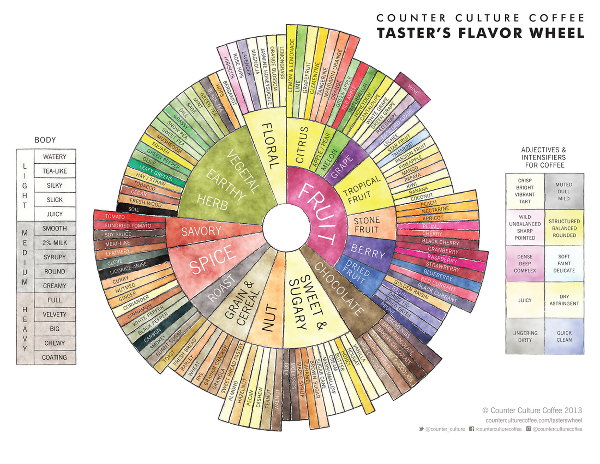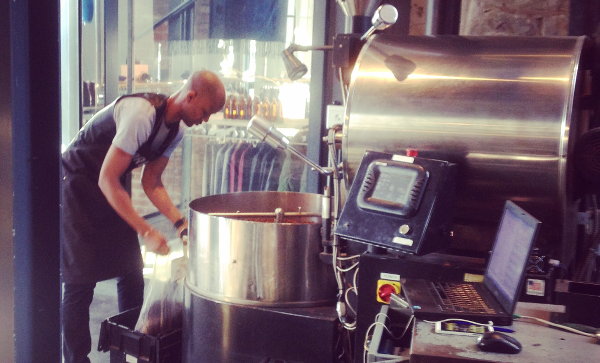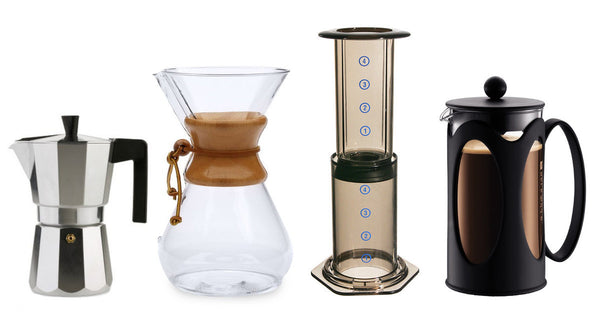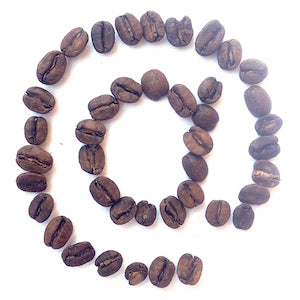7 Factors That Influence Coffee Flavour
As coffee lovers, we know that there is a really broad range of characteristics that you can find in coffee. From earthy tones to sweet fruit flavours, to floral and tea-like aromatics, there's an incredible spectrum of taste experiences to be had through our beloved beverage. But what is it that determines which of these characteristics will be found in your cup?

Unfortunately, there isn't a simple answer to that question. The science behind coffee flavour is still in its early stages and we're only just beginning to understand what is happening at the chemical level. There may be factors we're not yet aware of, and nobody is yet certain of exactly how much each step in the coffee supply chain influences the final product. Nevertheless, we do now know what some of the most important factors are.
Most coffee lovers can probably name a few of these flavour-influencing factors off the top of their heads. Everyone knows that roast profile matters, and most of our customers tend to think about origin as well, but in this blog post, we'd like to go back to the very beginning of the coffee production process and highlight some of the important steps along the way that determine what you'll taste in your carefully brewed cup of coffee.
1) Variety
Even before the plant that bears the coffee fruit has begun to grow, there's a very important factor that will influence the crop - the variety. It's not as simple as Arabica vs. Robusta (we'd generally recommend staying away from the latter). Within the species Arabica, there are dozens of known varieties and more being discovered and created with time.
Wine lovers will tell you that variety has a big impact on the flavour of what's in the glass. A Cabernet Sauvignon has very different characteristics from a Cinsault, or a Riesling. Similarly in coffee, which variety (or combination thereof) is in your coffee will have a big influence on your experience as the drinker.
As Jono from Rosetta Roastery pointed out in the recent Coffee Brewmance podcast episode, many coffee lovers probably don't think about and talk about this important factor quite enough.
Additional resources
If you want to learn more about variety, here are some great online resources:
- Counter Culture video with Peter Giuliano on coffee variety (~30min):
- List of known coffee varieties on Wikipedia: https://en.wikipedia.org/wiki/List_of_coffee_varieties
2) Terroir
Whether you're talking about wine or coffee, terroir is one of those lofty terms that can alienate some people, but really, terroir is just influence of where the coffee is grown. We all know that coffees from Kenya generally taste pretty different to coffees from Brazil. We also know that coffees from nearby areas can have similarities. These are the results of the influences of terroir.
Of course the specific elements of a terroir that are responsible for the impact on coffee flavour are numerous and complex, but here are some of the important ones:
- Altitude
- Climate
- Soil type
- Soil micro-biome
- Topography
We're certainly not suggesting that you need to understand every element of the terroir of every coffee you drink, but paying attention to where your coffee comes from, and what some of the defining characteristics of that terroir are, is helpful if you want to understand your coffee better.
3) Farming Practices
Perhaps one of the most important and probably one of the most difficult factors to grasp as the final consumer, the practices of the farm where the coffee is grown will have a huge impact on the taste of the coffee you drink. Everything from the use of chemicals to planting patterns & pruning regimen are ultimately going to affect the nature of the crop.
One particularly important farming practice is picking. Much as with other agricultural crops, coffee is best when it is picked at optimal ripeness, but of course, coffee cherries don't ripen at a uniform rate. This means that for the best results, cherries must be picked by hand, by labourers who are trained to pay attention to the ripeness of the fruit they are harvesting.
Commercial-grade coffee is often strip-picked (i.e. whole clusters of fruit are picked at once) or machine-picked, which means that the final product is a combination of ripe and unripe fruit. While this is less expensive, it does not yield top quality coffee!
Additional resources:
- Wikipedia article on coffee production: https://en.wikipedia.org/wiki/Coffee_production
- Perfect Daily Grind: Speciality vs. Commercial Coffee
4) Processing
Once a coffee cherry is picked, the coffee seed has to be dried before being transported and eventually roasted by your local artisan roaster. The ways that this is done can vary widely and can have a huge influence on what the coffee finally tastes like. While this is a complicated topic in and of itself, here are a couple of categories to look out for:

Natural or dry-processed coffees
Natural/dry is the traditional African method of processing coffees. In this method, the coffee is actually dried while still in its fruit. This has the benefit of not requiring large amounts of running water and also allows more of the natural sugars of the coffee cherry to wind up in the bean that gets roasted. Natural processed coffees tend to have fruity flavours, and low acidity though sometimes they're also found to have lower clarity.
While this method of processing can be more economical in its execution, it runs a higher risk of crop spoilage and the cherries must be manually turned frequently to minimise this risk.
Washed or wet-processed coffees
This more modern style of processing involves briefly fermenting the coffee cherries and then removing the seeds from the fruit or pulp - 'washing'. This method has an advantage in that with the outer, fruity layer, some of the risk of spoilage is removed.
Washed coffees tend to have higher acidity and more clarity, characteristics that have made them very popular in coffee's third wave.
Honey processing and everything in between
Recognising that both wet & dry processing have their benefits, a third way, or collection of ways, of processing coffee have emerged that are meant to balance the benefits of both methods. In very simple terms, honey-processed coffees are dried with some but not all of the outer layer of the coffee cherry removed.
There are many different styles of coffee processing, often referred to by the colour of the final dried crop (yellow, red, black) and for the most part, they just entail removal of different amounts of the outer mucilage.
Note, not all processing methods fall neatly into these categories - see the additional resources below
Additional resources
Processing is a factor that is getting a lot of attention in the world of coffee these days. What you'll read above is the most simplistic explanation of the types of processing possible. We'd highly recommend you dive deeper on this topic if it's of any interest. Have a look at:
- Perfect Daily Grind: Everything You Need To Know About Honey Processing
- Coffee Research: Flavour Characteristics Due To Coffee Processing
- Sweet Maria's: Why You Should Know Giling Basah
Let's Pause & Reflect
This is a good moment to pause and reflect on the myriad of influences on the coffee in your cup. One important thing to point out is that we've gone through more than half of the list, and we haven't even come to the point where a roaster has had any contact with the coffee.
That isn't to say that what the roasters do isn't important. On the contrary, the point that is worth reflecting on is that, beyond the literal implication of their titles, your coffee roasters are also undertaking the challenging task of understanding all these influences on coffee flavour for you when they source the green.
It's also worth noting that each of the steps we've covered so far will have a significant impact on the cost of the coffee. This translates into the price that the coffee roaster pays for the green beans. So when you wonder why one coffee may cost much more than another, you probably need to look to these pre-roasting steps in the process.
5) Roast Profile
We may be getting into more familiar territory here, but that doesn't mean that we shouldn't reflect carefully on the impact of roast profile on flavour. Not even the most talented roaster can take poor quality green and make it taste delicious, but an un-skilled roaster can certainly ruin a great lot.
After sourcing and selection, the roaster helps to realise the full potential of the coffee by carefully crafting a roast profile that will suit that set of beans. This isn't as simple as light or dark - on the contrary, roast colour can be pretty misleading. The roaster has to fine tune variables like roast time, charge temperature, rate of rise, drum speed, air flow & cooling speed, while responding to data like temperature logs, first and second crack timing, and most importantly sensory experience.

This process takes time and is costly, particularly since several batches have to be roasted before the coffee can be sold. But, once this process has been completed, a well roasted coffee isn't just pleasant to drink, it's also distinctive. It helps us to experience the influences of all the steps that came before that roast.
6) Blending
Most of the coffee that the world drank a few decades ago was blended. While that's still probably true across the coffee industry as a whole, in the speciality segment, single origins are becoming increasingly popular. That is most probably because they allow the drinker to experience the fruits of the coffee farmer's labour (quite literally).
Nevertheless, blending can be a masterful craft in its own right. In its basic forms, it can ensure a more consistent flavour experience throughout the year as the inputs to that blend change with the season. At its best, a blend can be a unique taste experience, whose flavour is more than just a sum of those of its component parts.
Additional thoughts on blending
After receiving some consistent feedback from a few coffee professionals that we really respect on this particular point, we felt compelled to add a couple of thoughts to this section on blending.
- It's worth acknowledging that one of the primary reasons that some roasters blend is not necessarily to create a better flavour experience but to create a decent one at a lower cost. By combining high quality and lower quality components, you can produce something very drinkable at a much lower cost per kg.
- One probably needs be careful about overstating the consistency that can be achieved through blending. After all, if you're changing components of a coffee, and we understand that all the steps prior to blending alter the flavours of those components, you can't create a truly consistent flavour experience over a significant time span and with different ingredients. This might be why we see more and more seasonal blends, that fully embrace the reality that consistency year round is impossible and rather seek to create a series of unique flavour experiences depending on the components available at that time.
7) Brewing
Last but certainly not least, brewing is the final stage in the process from soil to palate, which can also have an important influence on coffee flavour. One mistake that new coffee lovers make is assuming that the exact same brewing parameters will bring out the best in every coffee. "What's your Aeropress recipe?" is certainly a common question among new aficionados.
Any barista will tell you, your brewing variables need to match the coffee your brewing as well as the brew method. In the case of espresso, they may even need to be tweaked to respond to ambient conditions like heat, humidity and altitude. Even in a simple manual brew method, changes in brewing variables can be the difference between a decent and a delicious cup.
Some important variables are:
- Brew ratio (water to coffee)
- Grind size (and uniformity)
- Extraction time
- Water temperature
This is where you can take part in the coffee flavour's journey, so if you're brewing for yourself (which you should be at least some of the time), we'd encourage you to challenge yourself to bring the best out of every bag of beans you buy. If you're not experimenting and tweaking, you may be missing out on the best your coffee can be.
Other factors
These aren't the only factors that affect coffee flavour. In truth, we probably don't even know them all. While we felt the 7 above were the most important to talk about, here are a few others that at least deserve a mention:
- Age of harvest (crop freshness)
- Packaging (how did the green get from origin to roaster)
- Age of roast (roasted bean freshness)
- Storage (both pre and post roasting)
Final thoughts
Much of the content of this blog post necessarily involves drastic simplification (despite its length). The reality is that you could devote a good chunk of a lifetime to understanding any one of the 7 factors mentioned above in its greatest detail. Nevertheless, pursuing some understanding of each of these variables is an important part of the appreciation of coffee.
Beyond reading everything you can, the best way to get a better understanding of all of these influences on coffee flavour is by talking to the people who work in coffee. Most of the information in this post has been gleaned through conversations with the roasters and other coffee professionals we work with. A special mention needs to go to our friends at Rosetta Roastery & Quaffee, who inspired this post with their talks at their recent coffee events.
Many thanks also to Counter Culture Coffee who designed the flavour wheel at the top of this post and have made it publicly available!


